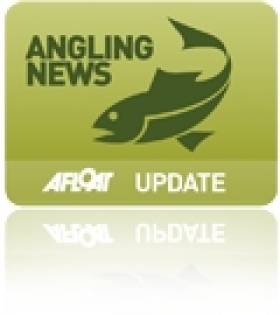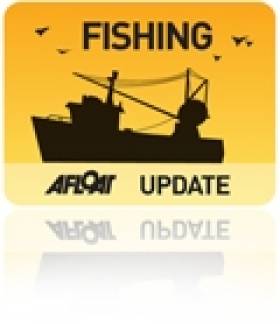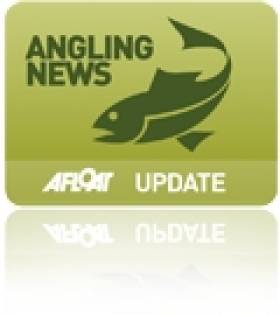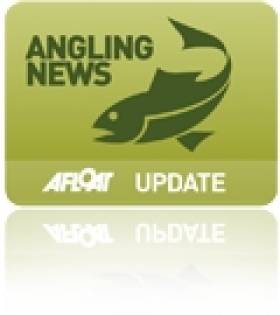Displaying items by tag: Inland Fisheries Ireland
'No Dip No Draw' Policy for Irish Anglers
Inland Fisheries Ireland has implemented 'no dip no draw' policy for competitive angling to prevent the spread of invasive species in Ireland's inland waters.
The policy, developed by the Irish Angling Development Alliance and endorsed by all affiliated clubs, aims to prevent Irish rivers and lakes coming in to contact with "a wide range of aquatic species of pathigens that could prove harmful to our game, coarse and pike fisheries" and which could "easily and inadvertently be introduced to Irish watercourses through contamination of angling equipment and associated gear".
As a result, disinfection prior to events for any and all angling equipment or tackle that comes into direct contact with fish or water is mandatory.
The IFI provides details for anglers and competition organisers regarding best procedure for implementing the policy in its Code of Practice, currently available online HERE.
Pest Control at Salmon Farms 'Insufficient'
Scientists have expressed disappointment after the publication of a report into strategies for improved pest control in Ireland's salmon farms.
According to The Irish Times, experts from Inland Fisheries Ireland (IFI) said the findings of the National Implementation Group were "insufficient to protect wild salmon and sea trout".
The report highlighted failures among a number of sites in the west of Ireland in controlling sea lice during the crucial spring period.
IFI says it is "a matter of priority" to review the location of salmon farms to ensure the protection of wild salmon and sea trout "while also meeting the needs of the commercial fish farm sector".
Bye-Laws for Wild Salmon Fisheries Approved
The Minister for Natural Resources, Conor Lenihan T.D., has approved a suite of regulations and bye-laws that will govern the wild salmon fishery in 2011. These will come into effect from Friday, 1 January 2011.
On receipt of management and scientific advice on the current status of Irish salmon stocks from Inland Fisheries Ireland and having considered submissions received through the public consultation exercise, the Minister of State introduced conservation measures for the management of the wild salmon and sea trout fishery in 2011.
Having signed the regulations and bye-laws the Minister remarked:
"I am cautiously optimistic about our native salmon stocks given the performance of stocks over recent years. The 2011 season will see 20 rivers which were closed in 2010 being opened because of an improvement in salmon stocks. 5 rivers which were previously closed for fishing, the Castletown, Suir, Glenamoy, Kerry Blackwater and Eske, will open with an identified surplus number of fish for harvest. 18 additional rivers will be open to angling on a "catch & release" basis."
"My caution is founded on the knowledge that 3 rivers which previously had been open will be closed on conservation grounds in 2011 (the Sheen, Screebe and Srahmore)", added the Natural Resources Minister.
In all the Standing Scientific Committee assessed 141 rivers and have advised that:-
· 52 rivers are open as a surplus of fish has been identified in these rivers (i.e. 2 more than in 2010);
· 29 rivers have been classified as open for "Catch and Release" only (i.e. 18 more than 2010 (see list below); and
· 60 rivers are closed as they have no surplus of fish available for harvest in them (i.e. 20 less than 2010).
The Minister also announced that in 2011 the cost of a one-day salmon angling licence (often used by tourist anglers) will be reduced by €12 (37.5%) on the recommendation of Inland Fisheries Ireland. "The purpose of the initiative is to give as much encouragement as possible to visiting tourist anglers to come to Ireland and experience the excellent game angling product being developed around our improving stocks" said Minister Lenihan.
With the exception of a proposed change to the number of blue (angling) tags applicable to a one-day salmon licence holder, the Wild Salmon and Sea trout Tagging Scheme Regulations for 2011 are in essence unchanged from the Regulations which were introduced following the establishment of Inland Fisheries Ireland in July, 2010. A number of minor amendments to the Regulations, recommended by Inland Fisheries Ireland, will provide for more effective administration of the tagging scheme regulations in 2011.
Summary of main changes to the management of the wild salmon fishery in 2011
19 Rivers which were closed in 2010 will open for angling on a "catch & release" basis in 2011:-
Ø Glyde (Dundalk fishery district)
Ø Slaney (Wexford fishery district) (note; river is closed until 12 May 2011)
Ø Bride (Lismore fishery district)
Ø Glengariff, Adrigole (Cork fishery district)
Ø Kealincha, Lough Fada, Behy, Owenascaul, Milltown, Feohanagh (Kerry fishery district)
Ø Grange (Sligo fishery district)
Ø Oily, Owenwee (Yellow River) (Ballyshannon fishery district)
Ø Bracky, Glenna, Tullaghobegley, Ray, Glenagannon (Letterkenny fishery district).
5 Rivers which were "catch & release" in 2010 and will open for harvest in 2011
Castletown (Dundalk fishery district)
Suir (Waterford fishery district)
Kerry Blackwater (Kerry fishery district)
Glenamoy (Bangor fishery district)
Eske (Ballyshannon fishery district)
3 Rivers which were open in 2010 will be limited to "catch & release" in 2011
Sheen (Kerry fishery district)
Screebe (Connemara fishery district)
Srahmore (Bangor fishery district).
8 Statutory instruments/Bye-Laws give effect to the decisions made by the Minister of State for management of the salmon fishery in 2011:
Wild Salmon and Sea Trout Tagging Scheme (No. 2) Regulations, 2010 provide for, among other things, the total allowable catch of fish that can be harvested by commercial fishing engines and rod and line from identified rivers.
Salmon Rod Ordinary Licences (Alteration of Licence Duties) Order 2010 and Special Tidal Waters (Special Local Licences) (Alteration of Duties) Order 2010: prescribe the licence fees payable from 1 January 2011.
Conservation of Salmon and Sea Trout (Catch and Release) Bye-law No. 873, 2010: specifies the rivers in which angling is permitted on a catch and release basis and associated conditions.
Conservation of Salmon and Sea Trout (Bag Limits) Bye-law No. 874, 2010: provides for the annual, season and daily bag limits for the 2011 season and also provides for fishing methods.
Conservation of Salmon and Sea Trout (Closed Rivers) Bye-law No. C.S. 306, 2010: prohibits angling for salmon and sea trout over 40cm in specified rivers.
The following bye-laws make provisions in relation to specific rivers:
Conservation of Salmon and Sea Trout (Newport River) Bye-law No. 875, 2010.
Conservation of Salmon and Sea Trout (River Bandon) Bye-Law No. 876, 2010.
Conservation of Salmon and Sea Trout (Garvogue River) Bye-Law No. 877, 2010
New Online Atlas of Irish Freshwater Fish
The National Biodiversity Data Centre has launched a new online atlas of freshwater fish in Irish lakes.
Produced in collaboration with Inland waterways Fisheries Ireland, the website features has a species search tool that gives access to detailed data and images for 23 freshwater fish species found in Irish lakes.
The lake browser tool also allows users to see what species were recorded where in 956 lakes across the country.
Not only a useful educational tool, the site could prove particularly useful for anglers looking for the perfect catch.
Public Consultation on the Wild Salmon and Sea Trout Tagging Scheme Regulations for 2011 Season
The Minister for Natural Resources, Conor Lenihan, has announced the start of a 30 day public consultation process on the Wild Salmon and Sea Trout Tagging Scheme Regulations for the 2011 season.
Regulations are made each year, after public consultation, for the management of the wild salmon and sea trout fishery, based on the scientific and management advice provided to the Minister by Inland Fisheries Ireland.
In launching the public consultation process the Minister remarked,
"The 2011 season will see 20 rivers which were closed in 2010 being opened because of an improvement in salmon stocks. Nineteen rivers will be open to angling on a 'catch & release' basis and 4 rivers which were previously closed, Castletown, Suir, Glenamoy and Eske will open with an identified surplus number of fish for harvest."
In all the Salmon Standing Scientific Committee assessed 141 rivers and have advised that:-
· 51 rivers are open (a surplus of fish has been identified in these rivers) i.e. 1 more than in 2010
· 30 rivers have been classified as open for "Catch and Release" only i.e. 19 more than 2010 (see list below) and
· 60 rivers are closed (no surplus of fish available for harvest) i.e. 20 less than 2010.
With the exception of a proposed change to the number of blue (angling) tags applicable to a one day salmon licence holder, the draft Tagging Scheme Regulations for 2011 are in essence unchanged from the Regulations which were introduced following the establishment of Inland Fisheries Ireland in July, 2010.
A number of minor amendments to the Regulations have also been recommended by Inland Fisheries Ireland, which will provide for more effective administration of the tagging scheme regulations in 2011.
Summary of main changes to the management of the wild salmon fishery in 201120 Rivers which were closed in 2010 will open for angling on a "catch & release" basis in 2011:-
Glyde (Dundalk fishery district)
Slaney (Wexford fishery district) (note; river is closed until 12 May 2011)
Bride (Lismore fishery district)
Glengariff, Adrigole (Cork fishery district)
Kealincha, Lough Fada, Blackwater, Behy, Owenascaul, Milltown, Feohanagh
(Kerry fishery district)
Grange (Sligo fishery district)
Oily, Owenwee (yellow river) (Ballyshannon fishery district|)
Bracky, Glenna, Tullaghobegley, Ray, Glenagannon (Letterkenny fishery district).
4 Rivers which were "catch & release" in 2010 and will open for harvest in 2011 Castletown (Dundalk fishery district)
Suir (Waterford fishery district)
Glenamoy (Bangor fishery district)
Eske (Ballyshannon fishery district).
3 Rivers which were open in 2010 will be limited to "catch & release" in 2011
Sheen (Kerry fishery district)
Screebe (Connemara fishery district)
Srahmore (Bangor fishery district).
The Minister is giving statutory notice of his intention to make the Wild Salmon and Sea Trout Tagging Scheme (No. 2) Regulations, 2010 to provide for the management of the wild salmon and sea trout fishery by Inland Fisheries Ireland in 2011 following the 30 day public consultation.
Any person may submit objections to the draft regulations at any time during the period of 30 days commencing on 20 November 2010 either in writing to the Department or by e-mail to [email protected]
Details of the conservation proposals for 2011 and the draft regulations are available on the Department's website http://www.dcenr.gov.ie/Natural/Inland+Fisheries+Division/Consultation+Process+Wild+Salmon+and+Sea+Trout+Tagging+Scheme+Regulations+for+2011+fishing+season.htm
Inland Fisheries Ireland Established
Minister for Natural Resources Conor Lenihan heralded the establishment of Inland Fisheries Ireland (IFI) today as an “historic development in the way we protect, conserve and develop our nationally important inland fisheries resource”. The IFI replaces 17 bodies formerly involved in the management of the resource and is fully operational as of today.
The establishment of IFI is an important milestone in delivering a new approach in the management of the inland fisheries sector. The Minister stressed his determination as Minister to effect change where this is needed. He said “We need a structure and organisation fit for purpose in the 21st Century. IFI will build on the achievements of the past, but with the strategic focus and organisation necessary to deal with the challenges facing the sector in the future in the context of the reform of the public sector as a whole”
The replacement of the Central and seven Regional Fisheries Boards, the National Salmon Commission and the eight Fisheries Co-operative Societies with IFI is in keeping with the Government programme for the rationalisation of State bodies.
The Minister observed “By contrast with the previous situation, where there were over 150 board members overseeing the management of the sector, in establishing IFI, I have put in place a small focused nine member board, which will be better able to adopt a much needed high level approach to strategic issues. It will also provide effective and efficient stewardship of IFI.”
Minister Lenihan emphasised “There are no additional Exchequer costs associated with the establishment of IFI. On the contrary, I am eliminating multiple agencies, creating a tight focused board, and in line with the McCarthy report recommendation, IFI will be charged with delivering its tasks with an already reduced budget.”
With in excess of 70,000 km of rivers and streams and 144,480 hectares of lakes, over 400 staff are currently employed by the fisheries boards in managing and protecting this resource. The staffing needs of the new structure will be met through existing resources and, in keeping with the Government’s commitment to optimise the use of resources, there will be no increase in the overall staff numbers in the inland fisheries service.
The Minister said “From the outset IFI will have a clear focus on efficiency and value for money and an obligation to identify areas where there is potential for additional savings. This will be achieved though the better use of existing resources and opportunities to eliminate duplication by reason of the replacement of the 8 Boards previously involved in the management of our fisheries resource with a single national authority.”
The Minister stated that it would be difficult to quantify at this early juncture the anticipated savings for the establishment of the national authority at present as they will occur over time but it is expected that costs will be reduced and savings will be delivered. The budget for the sector for 2010 has already been reduced by over €2 million.
There has been a significant change in the approach in which the national fisheries resource is managed. This recognises the complex interplay of habitats and species, and ecological biodiversity and the further changes that are expected. The establishment of IFI will enhance the State’s ability to respond quickly and effectively to these challenges.
The Minister stated “I am determined that every opportunity must be availed of to effect economies and attain efficiencies from within the system to deliver further value for money against the significant Exchequer investment in this resource. That said I am also equally determined to safeguard the inland fisheries resource in the face of the very significant challenges it faces.”
The Minister again expressed his appreciation for the dedication and commitment to our inland fisheries resources shown by all of those who served on the former Fisheries Boards and said he was confident that they will continue to contribute to the management and development of the sector in the future in the national interest.



























































